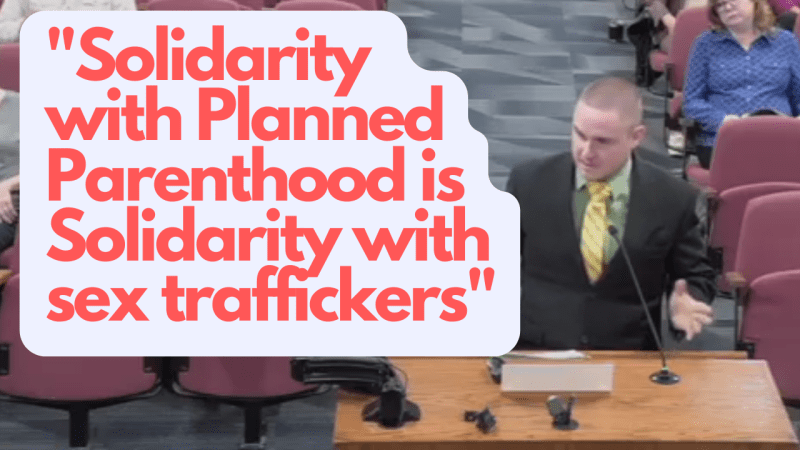[Originally published as Reflections on the importance of formal debate as a means of sanctification and being salt and light]
My opportunity to participate in the public comments section of the El Paso County Commissioners meeting on Jan 23, 2023, in regard to their resolution of “Solidarity with Planned Parenthood” has led me to contemplate more on the importance of formal public debate on issues of great importance.
While I was presenting this past Monday, I didn’t expect to be able to persuade all of the judges but was pleasantly surprised that one changed his mind. It was about both challenging their evil resolution AND about planting seeds in the minds of those listening in person and online. It was about emboldening them to stand for true justice for the unborn and against Planned Parenthood’s propaganda-filled narrative that is anti-women, anti-justice, and promotes situational ethics that weakens the moral conscience of our society.
Speaking to our County Commissioners has reminded me why I’m so grateful for the opportunity to be a director in the Challenge program in Classical Conversations. It has been a blessing to my own growth and given me a greater context for understanding the importance of formal debate.
In the Classical Conversations Inc (CC) Challenge program, students are taught how to do Team Policy Debate and Lincoln Douglas Debate. Formal debate is (overall) a lost virtue for our culture. Classical Christian education is all about using and revitalizing these “lost tools” and reminding people that these “old paths” are good, beautiful, true, and God honoring.
Learning such tools trains the presenter to be careful with their words and time.
During the recent El Paso County Commissioners public comment portion, each person only had five minutes to present. In Team policy debate with CC, the students have eight minutes to “construct” their case for the affirmative or negative in response to the stated resolution. They also have a teammate to help them continue to “build” on their case for or against the resolution.
While preparing my speech for this past Monday, I used a rough version of the CC Team Policy debate grammar/outline. I had to trim it down several times to stay within the 5-minute limit. I was nervous out of my mind and just wanted to share the truth with these judges and anyone listening. It was the prayers of many saints, firm convictions in God’s Word, and His Spirit strengthening me that carried me every step.
I wanted to communicate the message clearly using the tools I’ve learned to communicate the goodness of true justice vs. their resolution of injustice. I’ve told several people afterward that this resolution had so many logical fallacies that I wish there was an opportunity to address more of them.
So, I’ve been thinking more about the value of intentionally collaborating with others that understand the “grammar” of Team policy debate format. This type of collaboration could lead to several people continuing to build upon my “first negative constructive” speech that I gave before the judges.
Granted, I think several other heartfelt and effective presentations were given this past Monday, for which I am very grateful for their presenters’ boldness. They encouraged me greatly. I prayed for them and thanked them afterward. Almost all of them shared the gospel and many of them were very effective, and I praise God for that.
How much more amazing could it have been if we had been able to work together before these meetings. There is great value in being able to build multiple cohesive speeches presenting a constructive case against an evil resolution, or having several rebuttals to the affirmative case for a resolution, in a way that specifically complements and expands upon each other’s arguments/case. On a smaller scale, this type of complementing other speeches happened unintentionally in various cases because we are in agreement on the value of life.
This is why Challenge students prepare several notecards for both sides of an issue and then quickly organize their evidence to prepare a response to the arguments of the other side and further share evidence to support the main points/observations on your “constructive” side.
Semper Paratus! Always ready!
I believe Christians should:
Train in rhetoric:
We should consider training in speech and debate as a means for proclaiming the gospel and being “salt and light” in our culture.
Make the most of every opportunity in public and formal settings:
(when appropriate) Treat city council and commissioner court comment times as an opportunity to debate and challenge evil resolutions in a calm, reasoned, humble, and clear manner.
Organize and promote more formal debates on significant topics
We should organize more formal debates and bring back this “Lost tool” in our culture. The formal debate “grammar” (how it works) gives the structure for a reasoned presentation and not just the typical yelling that you see people doing in various settings.
This is a radically different approach from the presidential debates of the past few elections. Those aren’t debates, nor do they reflect careful research and argumentation. That’s quarreling, and Christians are called to avoid that type of behavior.
Sadly, too many Christians have seen such behavior and decided to give up on the value of careful listening, persuasion, apologetics, and formal debates altogether. Instead, they assume it’s best to “just serve people” and “don’t worry about answering their false ideas of speaking the gospel….just love them.” Consequently, they have abandoned a key way Christians should be “salt and light” in their culture.
Our proclamation of the truth should be more than just words (serving) and a defense of the truth, but it should not be less. Let’s serve people and tell them the truth. Loving people means we tell them the truth with gentleness and reverence before God (1 Peter 3:15).
Parents & Youth Pastors should work together to encourage this skill.
I believe this experience is vital whether or not a student will go into a career that will involve formal presentations and debating (lawyer, actor, apologist, etc.). The skills learned in formal debate, particularly the defense of Christianity and Christian morality, teach others the skills of careful reasoning, attentive listening, proper research & weighing ideas, logic, identifying logical fallacies, being concise in a presentation, and the beauty and art of using every word to the glory of God.
Let’s speak, read, think, and persuade others to the glory of God! We live to know God and make him known!







